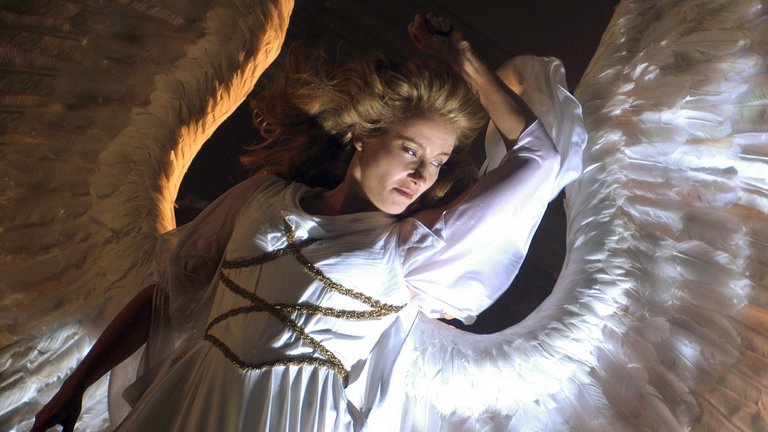Television Review: Angels in America (2003)

Mike Nichols’ career as a director traversed stage, screen, and television, cementing his legacy as a master of adapting literary and theatrical works for broader audiences. His transition to television culminated in two landmark HBO projects: Wit (2001) and Angels in America (2003), both of which showcased his theatrical sensibilities and earned critical acclaim. While Wit brought him an Emmy, Angels in America became a cultural phenomenon, securing multiple Emmys and Golden Globes. The latter’s success was amplified by the political climate of the early 2000s, positioning the series as a defiant rebuttal to conservative ideologies and solidifying its status as a progressive cultural touchstone.
Based on Tony Kushner’s Pulitzer Prize-winning 1991 play, Angels in America is a sprawling, ambitious exploration of the AIDS crisis, homosexuality, and the moral decay of Reagan-era America. The play’s two-part structure—Millennium Approaches and Perestroika—was a bold theatrical experiment, blending political satire, personal tragedy, and mythic allegory. By adapting this dense, dialogue-driven work for television, Nichols faced the challenge of translating its layered themes and complex characters to the screen while maintaining the play’s urgency and scale.
The miniseries opens in New York City in 1985, a period marked by Ronald Reagan’s indifference to the AIDS epidemic ravaging gay communities in cities like New York and San Francisco. Prior Walter (Justin Kirk), a gay man recently diagnosed with AIDS, is abandoned by his partner, Louis (Ben Shenkman), who flees in fear of the disease and the stigma attached to it. Meanwhile, Joe Pitt (Patrick Wilson), a closeted Mormon man, arrives in New York to work under the notorious Roy Cohn (Al Pacino), a real-life lawyer infamous for his role in McCarthyism and his association with the Republican establishment. Cohn, dying of AIDS but refusing to acknowledge his sexuality, embodies the hypocrisy of power and conservatism. Joe’s strained marriage to Harper (Mary-Louise Parker), a woman escaping her emotionally barren life through Valium, unravels as he grapples with his identity. The narrative threads intertwine: Joe eventually forms a relationship with Louis, while Prior, aided by the angelic figure of Hannah (Emma Thompson) and the pragmatic nurse Belize (Jeffrey Wright), evolves into a prophet tasked with confronting divine complacency.
Angels in America was HBO’s most ambitious project to date, both financially and artistically, and its success was staggering. It drew record ratings, garnered over twenty Emmy nominations, and was hailed as a masterpiece of television. Much of this acclaim stemmed from its timing: the series aired in 2003, during George W. Bush’s presidency, a period marked by conservative dominance. By celebrating Angels in America, Hollywood and the cultural elite delivered a symbolic rebuke to Bush’s administration, which had courted religious conservatives and lagged in addressing gay rights issues. The series became a rallying cry, a cultural “middle finger” that resonated deeply in the era’s polarised climate.
Yet, viewed outside its political context, Angels in America reveals significant flaws. While the cast is uniformly exceptional—particularly Pacino’s chilling portrayal of Cohn and Thompson’s haunting turn as the angel—Nichols’ direction often feels overly reverent to the source material, resulting in a miniseries that prioritises fidelity over cinematic innovation. The six-hour runtime can feel interminable, bogged down by overwritten dialogue and heavy-handed didacticism. Kushner’s script, while intellectually ambitious, is weighed down by its own preachiness; its themes of religion, politics, and identity are often stated rather than dramatised, leaving little room for subtlety.
One of the most jarring creative choices is the decision to have actors play multiple roles—a theatrical device that, while innovative on stage, feels pretentious on screen. Similarly, the surreal elements—such as Prior’s encounters with angels and ghosts—serve as potent metaphors in the play’s abstract staging but feel overly literalised in Nichols’ adaptation, diminishing their symbolic impact.
Today, nearly two decades after its release, Angels in America faces the challenge of relevance. Homophobia has all but vanished in mainstream American culture, and advancements in HIV treatment have shifted the crisis from a death sentence to a manageable condition. While the series remains a vital historical document, its polemical tone and self-indulgent excesses may alienate modern audiences. Comparisons to films like Philadelphia (1993) and And the Band Played On (1993) highlight a stark contrast: those works focused on individual stories with visceral emotional clarity, whereas Angels in America prioritises grand ideological statements over human-scale drama.
The miniseries’ greatest strength—its fearless confrontation of systemic injustice and moral hypocrisy—is also its weakness. Kushner’s radical politics, while admirable in their unapologetic stance, sometimes overshadow the characters’ humanity, reducing them to mouthpieces for ideology. Scenes that might have offered catharsis or introspection instead devolve into lengthy monologues, leaving audiences weary rather than moved.
Angels in America is a flawed work, a product of its time that is limited by its historical moment. Its cultural impact cannot be overstated, as it galvanised conversations about gay rights and challenged conservative narratives in a politically charged era. However, its reliance on didacticism and its occasionally stage-bound adaptation render it a challenging watch for contemporary viewers. While it remains a landmark of television storytelling, its legacy lies more in its sociopolitical significance than its lasting artistic appeal. For all its ambition, Angels in America is a relic of its era—an imperfect reflection of a society grappling with fear, prejudice, and the quest for redemption.
RATING: 2/10 (-)
Blog in Croatian https://draxblog.com
Blog in English https://draxreview.wordpress.com/
InLeo blog https://inleo.io/@drax.leo
Hiveonboard: https://hiveonboard.com?ref=drax
InLeo: https://inleo.io/signup?referral=drax.leo
Rising Star game: https://www.risingstargame.com?referrer=drax
1Inch: https://1inch.exchange/#/r/0x83823d8CCB74F828148258BB4457642124b1328e
BTC donations: 1EWxiMiP6iiG9rger3NuUSd6HByaxQWafG
ETH donations: 0xB305F144323b99e6f8b1d66f5D7DE78B498C32A7
BCH donations: qpvxw0jax79lhmvlgcldkzpqanf03r9cjv8y6gtmk9
I've watched it when I was a teen I remember this TV show really touch me and in some ways disturb me, but I remember that I loved it well I must rewatch it ❤️ it will be nice of I found in a new platform ❤️